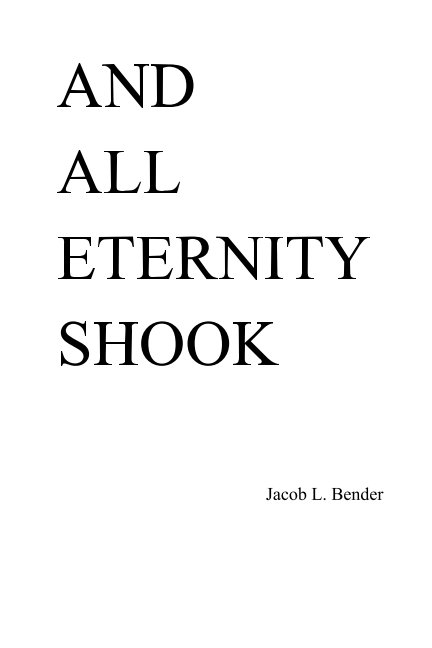
A young missionary comes home after two years in Puerto Rico only to find his mother on her deathbed.
Enraged, he wrestles with his God in passionate prayer as he pleads for her life; images and memories of his mission and his Mom jump, cut, and splice together in a cinematic crescendo, flashing furiously before his eyes as though he were the one dying and not her; all as he feels after some miracle, some impossibility, and the peace which surpasses understanding.
In this, our first book-length message in a bottle, Ships of Hagoth seeks to shine a light on the hitherto undiscussed yet very real phenomenon of missionaries losing loved ones while serving—an experience that only those who have passed through it can fully understand, yet which this book still seeks to communicate. We hope—for “one must needs hope”—to spark other works taking seriously the idea that, if the “unspeakable gift” of the Holy Ghost manifests in “groanings beyond utterance,” then we must find radical new ways to express it; that are, like Hagoth, “exceedingly curious,” and so build new ships in search of unknown lands; that don’t just say new things, but find new ways to say them.
Jacob L. Bender is also the author of Modern Death in Irish and Latin American Literature (Palgrave Macmillan, 2020), a work similarly rooted in his Puerto Rican mission service and his mother’s passing—which events have likewise been alluded to on this very site. In LDS studies, he has also written for Dialogue, Sunstone, Peculiar Pages, the Eugene England Foundation, and The Association of Mormon Letters.
And All Eternity Shook, a work of creative nonfiction, will be released by the end of April, 2022.
Excerpt: Chapter 1
No one ever told me that grief felt so like fear.
-CS Lewis
But then my eyes fall, for I see that which I had not considered.
I remember it like it was tomorrow.
At the end of the terminal, Mom sits a shadow of her former self—frail, pale, white, already a ghost. Her long blond hair is suddenly short, thin, curly, gray. Her face is emaciated, weary, and wary. Her arms are almost skeletal, they struggle into the air. Her once-firm belly bulges beneath her medical gown, but not with life. She always looked young for her age; now she’s old before her time.
Tears stream from her eyes—her lifetime of quiet reserve has broken. No mascara streaks, no cover-stick, no figure-flattering dress, her native vanity has vanished, for she’s far beyond such things now. Rising from her wheelchair, she forces her feet to support her weight for the final time, in a horrifying effort to stand forth and embrace her son.
And I falter.
Dear God in heaven.
I don’t even recognize her.
Take a breath. Bite your lip. Force eye contact and step forward. Quickly now, lest they catch you catching.
Absently I adjust my tie and my flapping suit jacket (I’ve lost a lot of weight), I reposition my fraying shoulder bag. For the first time in two years, goosebumps ripple up and down my spine.
I can feel hers through her loose-fitting gown. Carefully I embrace her—gently now, or she’ll crumble in your arms! Her hands are now and exhausted as they wrap awkwardly around my back; she places her palms on the precise spot that for months now contorts me in pain at the slightest pressure, but now I don’t feel a thing. She whispers hoarsely, “I’m so glad you’re home, I love you so much…” or some such, I don’t know, I’m not really listening. She exhales deeply. She is finally at peace.
All mine is gone.
As uncomfortable as I am—as much as I feel the urge to shove her off in disgust and sprint down the terminal, past baggage claim and into the night screaming blasphemies—still I let her hold me as long as she wants, while I take long, deep, slow breaths and mentally count to ten and force a mumbled “Love you too Mom.” Finally, of her own volition, she unwraps her arms and is helped back into the wheelchair. I force a smile, pose for some pictures, greet the other well-wishers and shake their hands—for a flash I’m ashamed of the relief I feel at their firm, healthy grips. They comment on my deep tan, my Spanish accent, all as I nod and try furiously to remember their names. I almost forget to embrace my own Father, and my brother’s a near afterthought.
At baggage claim, I stare for my luggage like I would for a sniper, a fist-fight, a Zen koan, a math problem or a life-raft, something, anything, to lunge at and grasp, to engross my attention for even a few short seconds, and not have to wonder whether I should incline my head slightly to the left towards the frail woman breathing heavily in the wheelchair beside me and come up with something, anything, to say to her before she drifts unconscious, and so run the risk of appearing before my relatives as callous or worse a blubbering mess, and I resent deeply that I suddenly care again what others think of me—
Mercifully my luggage tumbles down the carousel and I snatch it like a drowning man. Before anyone else can attempt small-talk, I march it out the revolving doors. Dad pulls up the car. Mom is carefully helped into the front passenger’s seat by everyone else but me. Planes roar over the low Oregon clouds on this, the Autumn Equinox of the Year of our Lord 2004. Soon the sun will rise in the Caribbean, but here it’s still mid-night. I shiver again, and I don’t know if it’s from the autumn chill or if it’s a shudder. I get in the car last.
And Abraham ascended Mount Moriah. Or am I Isaac? No.
I am Jacob.
